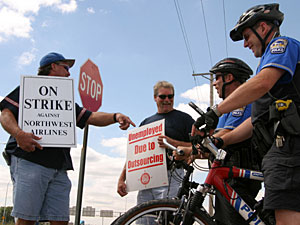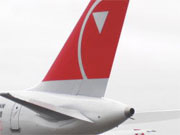August 24, 2005
 |
| Airport police share a moment with striking Mechanics Union members at the Minneapolis International Airport. Airport security has been beefed up in an effort to keep the strike peaceful. (Photo by Cory Ryan/Getty Images) |
St. Paul, Minn. — When they walked off the job Friday night, Northwest mechanics entered the uncomfortable dual identity of the striking worker. They are not working, and the airline isn't paying them anything. But technically each remains a Northwest employee, and the union contract means they will remain one until they individually choose otherwise.
According to Josh Javits, a former chairman of the National Mediation Board, this state could technically last forever. "There is no final required date at which the parties resolve the dispute," Javits says. "They may never resolve their dispute."
Javits says until the two sides feel like talking, the labor standoff will persist. At present there are no talks scheduled between the mechanics and the airline. When they were last at the table, the airline reportedly demanded layoffs of about half the union workforce, and a 25 percent pay cut. Mechanics said the level of layoffs was unacceptable.
Under U.S. law, a striking Northwest mechanic has the right to leave the picket line and go back to work. At this point the legal details begin to boggle the mind of even labor law experts. But essentially Northwest must offer that mechanic the last offer it placed on the table in negotiations.
University of Minnesota professor of industrial relations, John Budd, says, "Northwest can legally impose whatever terms and conditions of employment it has proposed to (the union) and essentially say, 'Those are the new terms and conditions of employment. If you want to work under those terms, you can come on back. If not, you can stay on strike.'"
As the strike began, Northwest said returning mechanics would make $26.53 an hour. The airline's last offer to cleaners was $15.69 an hour. Though these would represent a major drop from union wages, they might look more appealing as the strike wears on.
But there's a catch. Labor experts say Northwest does not necessarily have to bring a mechanic back to work if it doesn't have an opening. They also say it's not clear whether the temporary replacement mechanics would qualify as filled positions. What is more clear is that if Northwest were at some point to designate its temporary contingency workforce as a permanent one, it could become more difficult for a union mechanic to return.
And what about the union itself? Officials with the Aircraft Mechanics Fraternal Association have suggested the contract showdown was ultimately an effort to break the union. That is not so easily done; even in a strike, the union contract remains in effect at Northwest. Former NMB chairman Josh Javits says what's more, because of that contract anyone who comes to work at Northwest as a mechanic -- even as a strike breaker -- is automatically supposed to be a union member.
"They would be covered by an AMFA agreement, even if that's unilaterally imposed by Northwest in this case, and be subject to the union's membership and dues-paying and service requirements of the collective bargaining agreement," Javits says.
But again there are complications. Javits says it's not clear, but Northwest may have gotten around this provision of U.S. labor law by hiring replacements through contractors, rather than making them actual employees of the airline.
And it seems unlikely AMFA leaders would acknowledge their newest members any time soon, given that they are currently focused on harassing the workers they derisively call "scabs." AMFA may walk away from Northwest rather than represent them, and a new union may even enter the picture.
If history is any guide, the union and the airline will sit down again, rather than allowing the strike to drag on into oblivion. Javits says it will happen when one or both are worn down from the strike, and the National Mediation Board feels the time is right.
"There's always hope," he says. "Sometimes when parties beat each other up, there comes a point when they need to say, 'We need to work together.'"
That doesn't mean the negotiating table they return to will be level. The intervening months will determine who has the upper hand if and when talks resume.





